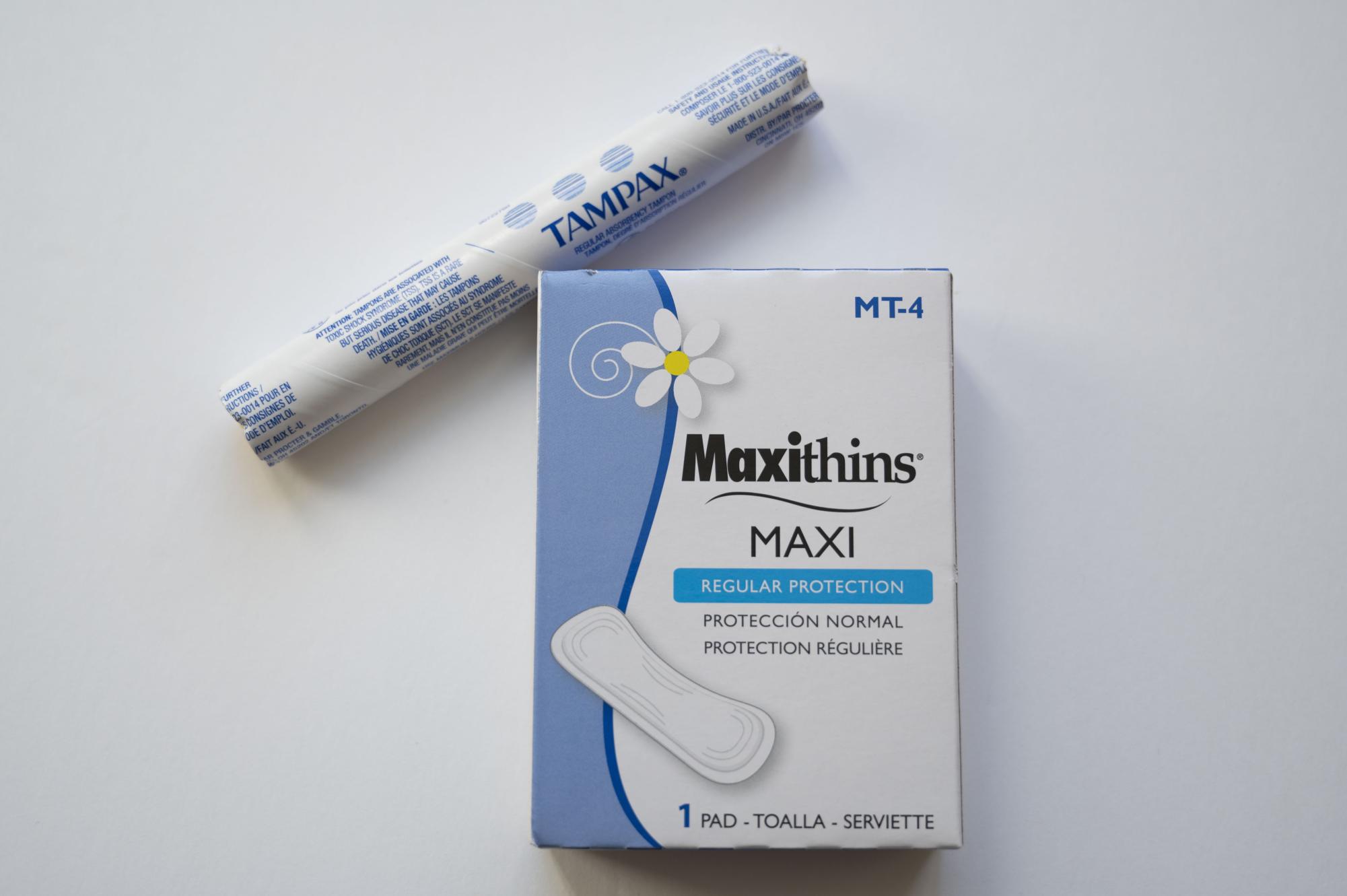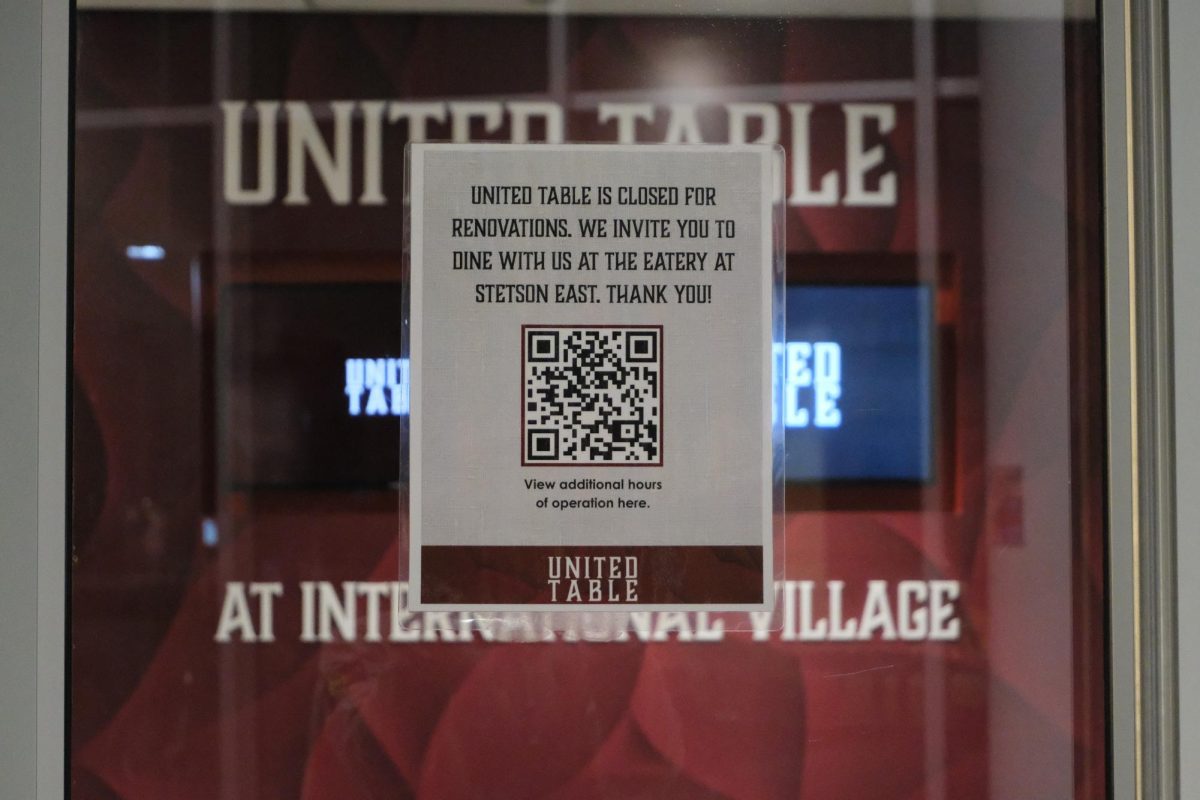Ashley Plant, a third-year biology major in need of a tampon, put a quarter into the menstrual product dispenser in Snell Library. But nothing came out.
Instead of running home and risking losing her spot in Snell, she ran around the library, forced to ask a stranger if they had an extra tampon.
“There’s just usually nothing in there,” Plant said. “I’ve tried a couple of times to put a quarter in [the dispenser] and nothing’s come out.”
Northeastern says it stocks menstrual products in all women’s and all-gender bathrooms on campus, but an investigation by The News found a significant lack of supplies in the dispensers.
Over the course of February and March, a team of Huntington News reporters attempted to use pad and tampon dispensers in over 170 women and gender-neutral campus bathrooms, twice. The examined bathrooms were all accessible without a Husky card, and each dispenser was checked before noon in an attempt to avoid inspecting bathrooms after a day’s use.
Not included in this data are the dozens of university bathrooms which contained dispensers that either required payment, had no dispenser or were generally inaccessible to The News’ team of reporters.
Throughout 351 bathroom checks, excluding inaccessible bathrooms, The News found that dispensers were fully stocked with both pads and tampons only 45% of the time. More often, the data show, dispensers were stocked with either just pads or just tampons: 53% of total checked dispensers were stocked with pads and 64% were stocked with tampons.
During The News’ second bathroom checks, dispensers lacking pads were restocked only 21% of the time, and those without tampons were restocked 30% of the time.
Twenty-five percent of the time, dispensers had neither pads or tampons.
Including inaccessible bathrooms, only 39% of Northeastern’s bathrooms were accessible and fully stocked with both pads and tampons when checked by The News.
“All feminine hygiene product dispensers and vending machines on campus are restocked frequently for Northeastern students, free of charge,” spokesperson Ed Gavaghan wrote to The News. “Dispensers occasionally run out of items, but they are restocked quickly.”
Students who spoke with The News said the pad and tampon dispensers are often empty or not working in bathrooms around campus. Lack of product accessibility is a contributor to period poverty.
Nearly 25% of students on college campuses across the country experience period poverty, or difficulty affording and accessing menstrual products, according to a 2021 study. Another study shows those who experience period poverty over many months are more likely to report “moderate to severe levels of depression.”
Northeastern’s dispensers range from fully stocked to empty, depending on the building and the time, the investigation by The News found.
An article in Northeastern Global News published in April 2018 announced the university’s implementation of free menstrual product dispensers in campus bathrooms. But The News found that several of Northeastern’s newer buildings had menstrual product dispensers that required payment, including those in East Village, EXP and ISEC.
In response to an email from The News inquiring about dispensers that require payment, the university said “all ‘25 cent’ stickers on dispensers in ISEC have been removed.”
Grace Sherry, a third-year mechanical engineering major, said that while she’s seen period products in most bathrooms, there have been times when the dispensers did not work.
When asked what Northeastern can do to improve access to sanitary products, Sherry said, “making [menstrual products] available outside of just the bathrooms and making them available to any space.”
Two students on campus created a club to help combat a lack of period product accessibility and the health concerns with the current tampons that Northeastern currently provides. Prachi Patel and Maria Restrepo, both third-year behavioral neuroscience majors, created the Menstrual Equity Club, or MEC, after Restrepo learned about period poverty on a Dialogue of Civilizations in South Africa in 2023, where the subject of menstruation is considered taboo.
“Continuing these conversations is a really cool thing…and I think Northeastern has the capacity and ability to be more inclusive,” Restrepo said.
The MEC has partnered with Northeastern University Sexual Health Advocacy, Resources, and Education, otherwise known as SHARE, to push Northeastern to focus on sustaining safe, comfortable products in the dispensers.
The tampons that Northeastern currently provides have blunt cardboard applicators, which, though more environmentally-friendly than typical plastic applicators, can be rough and uncomfortable to use. The pads offered in restrooms are thick, another comfortability issue for many menstruators.
Patel and Restrepo surveyed Northeastern students in January. In this survey, 22 out of 31 students rated Northeastern, on a scale of one of five, a three or below for how easily accessible menstrual products are found in campus restrooms. A score of one indicated “I have never found easily accessible menstrual products in campus restrooms,” and five indicated “I always find easily accessible menstrual products in campus bathrooms.”
MEC and SHARE leaders say they are facing obstacles while working with the university, however they are still optimistic about “our future initiative to push forward what we want to do,” Patel said.
Patel, Restrepo and C Ledford, SHARE’s co-president and a fourth-year ASL-English interpreting major, said they pushed for the switch from HOSPECO machines to Aunt Flow, an organization that provides access to different companies and schools for menstrual products, but was told that they would need to fundraise themselves in order to make that happen. Other universities including the nearby Berklee College of Music have begun using Aunt Flow for machines and for products.
“Why should we be fundraising for something that the university should be able to provide without a hassle?” Patel said.
According to Patel, Restrepo and Ledford, the current dispensers only allow certain products in the machine, and changing the products would mean replacing the machines themselves, which would be costly.
“One thing to remember [is] Northeastern is still a business-like, money-making machine,” Patel said. “So [for] initiatives like this, money is not going to be spent unless there’s a real push for it.”
Partnering with representatives from Northeastern’s Health and Counseling Services, Vice Chancellor of Wellness & Student Success Dan Solworth and the the LGBTQA Resource Center, MEC and SHARE plan to start a pilot program on campus in the fall to compare whether students prefer the dispensers’ current Hospeco products or Aunt Flow products. The program will install Aunt Flow products in several locations along with QR codes that link to a survey about the products, the comfortability and effectiveness. This data will be used in buying future menstrual products.
The Menstrual Equity Club’s fundraising and donation drives prove that people do care about this issue and want to help, Restrepo said.
In collaboration with Pine Street Inn, the largest provider of services for unhoused people in New England, the MEC had over 2,000 menstrual product donations from Northeastern students.
“This is a whole human rights thing,” said Restrepo, who said access to period products is a “bare minimum.” “There’s no shame in demanding … more,” she said.
Restrepo expressed her aspiration for more change in diversity in the management of building services and for Northeastern to provide more education on the importance of the accessibility of menstrual products in bathrooms.
“[It’s] us with them versus the problem, but it’s feeling very much like an uphill battle now where it’s literally us versus them or not being heard,” Restrepo said.
Fighting for national access
Both local and national organizations have continued to advocate for access to free menstrual products in public bathrooms. Dignity Matters, a Framingham-based organization, is focused on distributing menstrual products, along with underwear, to homeless shelters, prisons and other places in need in order to reduce period poverty.
Dignity Matters, along with several other organizations, partner with universities across the country. Aunt Flow also works to increase accessibility to menstrual products in public bathrooms across the country.
According to Ben Weiner, an account executive for Aunt Flow, the organization recently partnered with Northeastern’s Seattle campus. Aunt Flow has donated over 6.3 million menstrual products across the globe and stocked bathrooms with over 29,000,000 products since its founding in 2016.
Massachusetts has not yet made menstrual products mandatory in every public restroom, however, several advocacy groups are currently lobbying for a bill that would make this possible.
“There’s a ton of advocacy going on at both the federal and the state level,” said Meryl Glassman, the development director of Dignity Matters. “Advocacy and that government support is truly the way that we’re going to end period poverty.”
Dignity Matters works closely with the Massachusetts Menstrual Equity Coalition and other organizations advocating for free menstrual products.
Another national advocacy group, PERIOD. is a “global, youth-fueled” non-profit organization that advocates for free menstrual products “through policy and legislation,” according to its website. It works to educate and distribute these products to people in need.
“Most of the time [PERIOD.’s] work is focused on training young people, so training our chapters to talk about it and advocate for it,” said Allyson Crays, a third-year law student at Northeastern and vice chair on the national board of directors for the organization PERIOD. “No federal program right now, like WIC, SNAP or Medicaid, can be used to purchase menstrual products.”
There are several bills that increase women’s access to menstrual products already in motion, like the “I AM” bill, which passed in the Massachusetts Senate but awaits a vote from the Commonwealth’s House of Representatives. The bill would provide menstrual care for all homeless shelters, prisons and public middle and high schools.
“Something I’ve been trying to do, and other folks also, is seeing a lack of access to menstrual products or menstrual stigma as a reproductive justice issue,” Crays said.
At the end of the day, Crays said, having accessible menstrual products is essential.
“It’s something you deal with every month and every day as hormones are fluctuating throughout the entire month, all driven by the menstrual cycle,” Crays said. “It is not something we can ignore as it impacts schools [and] impacts how you operate in the workplace.”
Rachana Madhav, Alexis Algazy, Galiah Abbud, Grace Sawin, Prachi Patel, Janira Skrbkova, Annika Sunkara, Elizabeth Scholl, Jessica Xing, Alexa Coultoff, Olivia Becraft, Mars Poper and Katarina Schmeiszer contributed reporting.
Editor’s Note: This article was updated Thursday, Sept. 5 at 1 p.m. to add a more up-to-date data point regarding the number of menstrual products Aunt Flow has donated.










